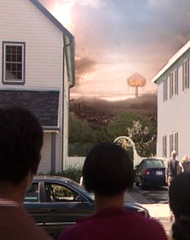“MySpace, Facebook, LinkedIN: Social networking is probably the biggest change in how people use the web. With nearly 100M visitors there is something going on here, yet it hasn’t taken off behind the firewall.” — Paul Pedrazzi, OracleAppsLab
Pedrazzi is not alone in wondering just what social networks might do for business. Geoff Livingston, on his new Now Is Gone book blog, noted that Facebook doesn’t build communities as much it reconnects existing relationships. Michel Fortin concludes “it's not a viable marketing tool. At least, not for me.”
So why all the hype? Enough hype that the Trade Union Congress (TUC) in Britain felt the need to issue a release defending worker on-the-job access to social networking sites. That eight percent of businesses report they are actually afraid of employee backlash if they ban social networks. That some claim social networks are an integral ingredient in our cyberspace environment.
Social networks present a viable and worthwhile consideration for any social media mix, but they do not seem well suited to support a sustainable communication strategy or meaningful content. More often than not, they are consumer-generated content billboards for traditional and new media (blogs) hoping to capture online nomads as they wander their way to watering holes for individual conservations, gossip, fun, and games.
Sure, a few have worthwhile applications like the questions/answers at LinkedIn or BlogCatalog discussions, which do lend well to creating a sense of community. Open niche networks like RecrutingBlogs.com work well too.
These examples aside, social networks seem best suited to be what early blogs hoped to be — a place for individuals to connect and have two-way conversations when they aren’t trying to out-scoop each other on finding new online content to talk about. There is nothing wrong with that.
Yet, sooner or later, the mad rush for numbers will be over and people will stand around asking themselves did I invest all this time in the right social network? Probably not.
It makes sense for me as someone engaged in social media to check out all the new applications that are readily and frequently available (about 100 times more than most social media gurus actually write about). But if it wasn’t for this reason, I think I might have a different message all together … call me when the nomadic online wandering is over and I’ll bring by a house-warming gift.

Pedrazzi is not alone in wondering just what social networks might do for business. Geoff Livingston, on his new Now Is Gone book blog, noted that Facebook doesn’t build communities as much it reconnects existing relationships. Michel Fortin concludes “it's not a viable marketing tool. At least, not for me.”
So why all the hype? Enough hype that the Trade Union Congress (TUC) in Britain felt the need to issue a release defending worker on-the-job access to social networking sites. That eight percent of businesses report they are actually afraid of employee backlash if they ban social networks. That some claim social networks are an integral ingredient in our cyberspace environment.
Social networks present a viable and worthwhile consideration for any social media mix, but they do not seem well suited to support a sustainable communication strategy or meaningful content. More often than not, they are consumer-generated content billboards for traditional and new media (blogs) hoping to capture online nomads as they wander their way to watering holes for individual conservations, gossip, fun, and games.
Sure, a few have worthwhile applications like the questions/answers at LinkedIn or BlogCatalog discussions, which do lend well to creating a sense of community. Open niche networks like RecrutingBlogs.com work well too.
These examples aside, social networks seem best suited to be what early blogs hoped to be — a place for individuals to connect and have two-way conversations when they aren’t trying to out-scoop each other on finding new online content to talk about. There is nothing wrong with that.
Yet, sooner or later, the mad rush for numbers will be over and people will stand around asking themselves did I invest all this time in the right social network? Probably not.
It makes sense for me as someone engaged in social media to check out all the new applications that are readily and frequently available (about 100 times more than most social media gurus actually write about). But if it wasn’t for this reason, I think I might have a different message all together … call me when the nomadic online wandering is over and I’ll bring by a house-warming gift.

















